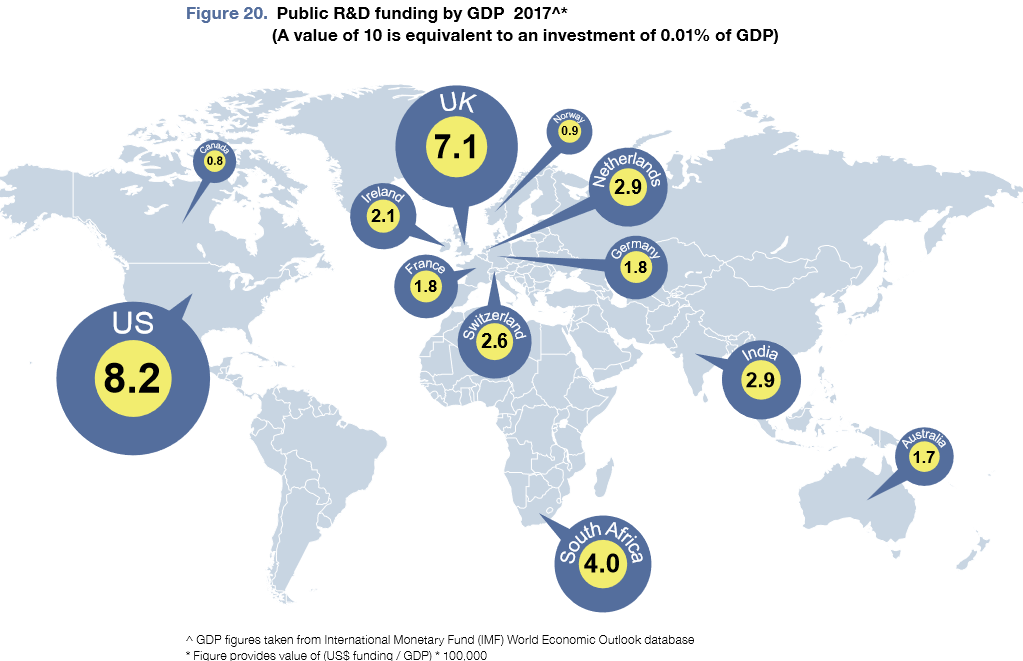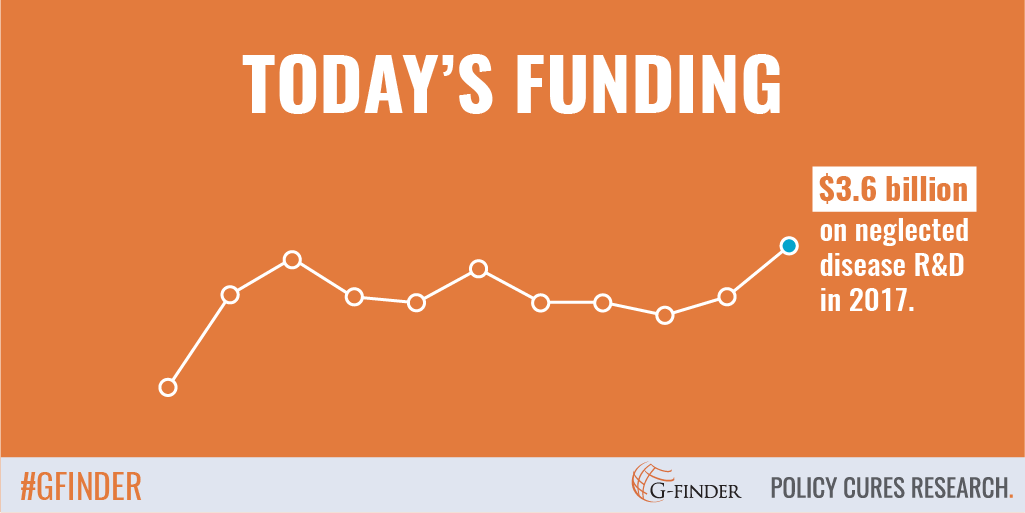Record increase in EU funding in 2017 to partnerships that support research to fight poverty-related and neglected diseases
According to new data in the annual G-Finder report published today, both the EU and the UK are slowly closing the gap on the US as the world’s largest supporters of research into HIV & AIDS, TB, malaria and other diseases of poverty. Download the report here.
Brussels, January 23, 2019: A new report launched in Geneva today by Policy Cures Research reveals that European Union funding for vital research into new vaccines, treatments, and diagnostic tools for diseases like HIV & AIDS, tuberculosis, malaria and other neglected diseases increased by $40m to $119m, a 50% increase on the previous year. This increase places the EU behind the UK and US as the world’s third largest funder of research into diseases of poverty.
“Great to see political support translating into financial support and an opportunity to sustain this commitment with Horizon Europe”
Cecile Vernant, Head of Deutsche Stiftung Weltbevölkerung’s (DSW) EU office, said: “It is great to see that the European Union’s political support for disease research is translating into more ambitious financial support. This record increase in funding in 2017 is positive news; we view it as a solid foundation that EU negotiators can build on as they enter the final negotiations on the EU’s future research budget for 2021-2027. What we really need to see coming out of these negotiations in 2019 is long-term, stable, and sustainable funding for vital research into diseases of poverty. Most importantly, , Europe’s politicians need to make sure there is a successor to successful partnerships like the European and Developing Countries Clinical Trials Partnership – an initiative that is delivering real progress in the fight against HIV & AIDS, TB, and malaria.”
The 11th GFinder launched today reports that $3.566bn were invested in global health research in 2017 – the highest level since reporting began, an increase of 7% from the previous year, and the largest annual increase in both relative and absolute terms since the financial crisis in 2009. The record EU increase in funding should be put in the context of anomalously low levels of funding in 2016 due to uneven disbursements by the European Commission to the relevant partnerships through which it funnels its funding in this area. What’s more, no donor country reached WHO-recommended levels of investment in health research, something that the EU and EU governments need to do if they are to be ambitious in their support of life-saving R&D.

G-Finder 2018 – Key stats
- Global funding for basic research and product development for neglected diseases in 2017 was $3.566bn, the highest level ever recorded by the G-FINDER survey
- HIV/AIDS, malaria and tuberculosis (TB) collectively received more than two thirds ($2.496bn, 70%) of all global funding for neglected disease R&D in 2017
- The public sector continued to be the most significant source of funding in 2017, providing almost two-thirds ($2.318bn, 65%) of the global total, increasing by $181m (up 8.5%).
- The 50% increase from the European Commission was the result of a nearly seven-fold increase in its funding to the European & Developing Countries Clinical Trials Partnership (EDCTP2, up $47m, 571%).
- Germany increased their funding in 2017 to $65m (up $18m, 39%), primarily due to additional funding from the German Federal Ministry of Education and Research (up $12m, 40%).
- Growth in UK government funding was driven by the Department for International Development (DFID, up $46m, 83%), and the Department of Health and Social Care (new funding of $40m), resulting in total expenditure of $186m in 2017 (up $87m, 89%).
The full G-FINDER report can be found (EMBARGO UNTIL WEDNESDAY 23 January, 11.30 CET) at: https://www.policycuresresearch.org/g-finder/
Contact:
Eoghan Walsh
Communications Officer, Deutsche Stiftung Weltbevölkerung (DSW)
T: +32 (0) 2 504 90 66 | Mob: +32 (0) 485 399 443
eoghan.walsh@dsw.org | www.dsw.org/
Notes to the Editor
- Deutsche Stiftung Weltbevölkerung (DSW) is a global development organisation that focuses on the needs and potential of the largest youth generation in history. We are committed to creating demand for and access to health information, services, supplies, and economic empowerment for youth. We achieve this by engaging in advocacy, capacity development, and reproductive health initiatives, so that young people are empowered to lead healthy and self-determined lives. With our headquarters in Hannover, Germany, DSW operates two liaison offices in Berlin and Brussels, as well as maintaining a strong presence in Ethiopia, Kenya, Tanzania, and Uganda. DSW also advocates for investment in research and innovation to fight poverty-related and neglected tropical diseases.
- G-FINDER, now in its eleventh year, is the most comprehensive report to date on global funding of R&D for neglected diseases like HIV/AIDS, malaria, TB, sleeping sickness and helminth infections. The G-FINDER report is intended to help policy makers, funders and product developers better understand the global landscape for neglected disease R&D, where funding gaps exist, and how their investments fit into the global picture. The G-FINDER survey is conducted by the independent research group Policy Cures Research and funded by the Bill & Melinda Gates Foundation.
- Policy Cures Research is an independent, not-for-profit group providing research, information, decision-making tools and strategic analysis for those involved in the creation of new health technologies for neglected diseases. Its focus is on providing governments, funders, researchers and civil society organisations with the information they need to make optimal R&D policy and funding decisions for diseases of the developing world.

